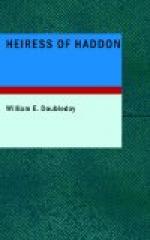The blow was parried by Sir Henry, who received it upon his jumping pole, and with blood now thoroughly aroused and life on either side to fight for, the conflict was furiously sustained.
The packman’s attack was at no time equal to the defence of his adversary, and as he rained down blow after blow they were coolly caught upon the pole, which, used in skilful hands in much the same fashion as the quarter-staff, made quite an admirable weapon both for attack and defence.
Such an unequal contest could not long continue. Science must ever triumph over mere brute force, and this occasion proved to be no exception to the rule, and as the man tired, his blows perceptibly weakened. Had Sir Henry by any piece of misfortune failed to protect himself, the end might have been different. His skill, however, saved him in the end, and as the fury of his opponent abated the knight became more vigorous in his attack.
The end soon came, for, raising his stout ash pole high up in the air, De la Zouch brought it down with, tremendous force, and easily breaking through the pedlar’s guard, it alighted heavily upon his head. With a groan the unlucky man staggered back and fell upon the turf. The blow had struck home, and the Derby packman was no more.
Whilst this scene was being enacted, Sir Henry’s page, missing his master from amongst the hawking party, had turned back in great trepidation to seek him. Guided by the sound of the blows, the youth had experienced little difficulty in attaining the object of his search, and, standing at a respectable distance, he had been a silent witness of the tragic conclusion of the encounter. Seeing that all was over, he slowly advanced, in a very uncertain state of mind as to the character of his reception.
De la Zouch was too busily engaged in a scrutiny of his late opponent to notice the arrival of his page, and upon the latter devolved the unpleasant duty of announcing himself.
“That was a featly stroke, my lord,” he began.
Sir Henry turned round, and a sigh of relief escaped him as he found it was not a fresh combatant with whom he would have to contend.
“Ha, Eustace,” he said, “There are many who would like to learn the trick of it; ’tis known to few besides myself, but I will teach it thee some future time.”
Eustace, too, gave a sigh of relief. His master was unusually gracious.
When Sir Henry spoke again, his voice was changed.
“Hast thou seen all?” he asked.
“I saw the end of it.”
“But the commencement?”
“No! I was—”
“Ah, well,” interrupted the knight, “’twas not my fault; I would fain have had thee witness its commencement, for, by my troth, the knave brought his fate upon himself.”
He rolled the corpse over and they turned to go, but ere they had proceeded many yards they came to a halt. De la Zouch had an idea, and they wheeled about and returned to the body once more.




